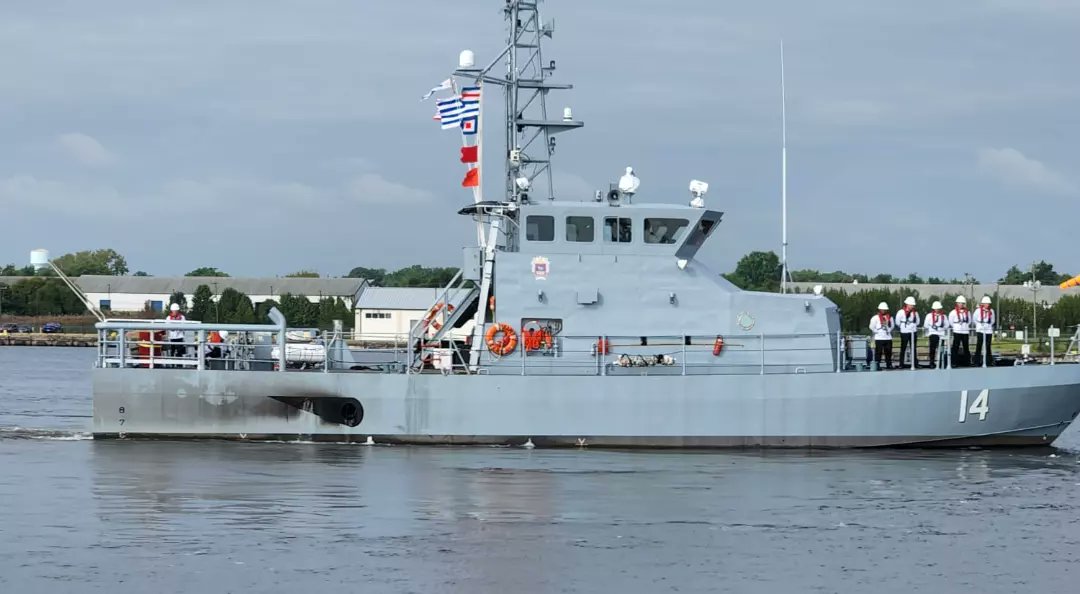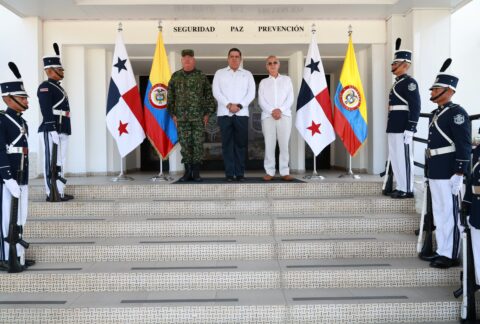The Uruguayan Navy received three Protector-class coastal patrol boats from the U.S. government. The handover ceremony took place in the United States, at the Coast Guard Yard in Baltimore on September 1. The Coast Guard cutters will arrive at Naval Base TN Carlos Macchitelli in Montevideo in early November to join the Sea Forces Command, the Uruguayan Navy said in a statement.
“These vessels mean being able to control, to monitor, presence, […] and response capability (…) on time,” Captain Marco Saralegui, chief of the Uruguayan Navy’s General Command, told Diálogo on September 22. “This capability was quite reduced, and the vessels increase this ability.”
The vessels were named ROU 14 Río Arapey, ROU 15 Río de la Plata, and ROU 16 Río Yaguaron. Two of the patrol boats will serve at the Fray Bentos Naval Base, on the Uruguay River, and the other in Montevideo, according to the Pucará Defensa website. The donation was made through the U.S. Department of State’s Excess Defense Articles program and amounted to $8.7 million, Uruguayan newspaper El País reported.
The ships will help maintain the country’s security through patrols, control of jurisdictional waters, detection of contraband, drug and human trafficking, search and rescue, assistance in international exercises, river operations with countries in the region, and support in emergencies, Capt. Saralegui added.
The 27-meter Protector ships have a range of 1,700 kilometers and a maximum speed of 46 km per hour. Within the U.S. Coast Guard, the vessels are used for national security missions, the U.S. Embassy in Uruguay said.
Each vessel will include a rigid-hulled inflatable boat, which can be launched from the stern using an innovative launch and recovery system, allowing crews to quickly intercept, inspect, and/or board other vessels while on patrol without stopping.
Key position

Because of its location, Uruguay has become an attractive transit country for cocaine trafficked from Colombia and Peru to international markets, InSight Crime, the investigative and journalism organization that specializes in organized crime in Latin America and the Caribbean, indicated in a report. Since 2021, the country has experienced an uptick in organized crime activity.
“We are aware that there are movements through our waterway, where Uruguay has a key position of entry and exit through the entire American continent,” Capt. Saralegui said. “Undoubtedly, the [donated] vessels will contribute in a very important way to increase our capability to control that waterway.”
When seizure rates reach 20 percent, narcotraffickers change routes and countries, leading to a second wave of alternative ports, including the Uruguayan port of Montevideo, reported Argentine platform Urgente 24.
Phenomena such as organized crime and narcotrafficking, due to their transnational nature, cannot be approached from the viewpoint of a single State. There is growing evidence that solutions require regional and international coordination and cooperation, says the report Crime and narcotrafficking, An Exploratory Analysis of the Uruguay Case, by the Catholic University of Uruguay.
Friendly forces
Washington and Montevideo have worked for more than 75 years to improve global and border security. The handover of the Protector vessels came in addition to four other Metal Shark-type boats the U.S. donated to Uruguay in 2019 and 2015 for law enforcement duties.
“The relationship between the U.S. and Uruguayan navies is a historical relationship of allied countries, which have similar values. We are friendly forces […],”Capt. Saralegui said. “The country […] has to professionalize with more modern systems, electronic systems. The U.S. Coast Guard has given us a lot of support to incorporate these capabilities,” he added.
“In Uruguay you will find a Navy and a country that seeks the welfare of its population and highly values international collaboration and coordination to achieve these objectives,” Capt. Saralegui concluded. “A Navy that is always in talks with the U.S. Navy to collaborate in various ways.”









